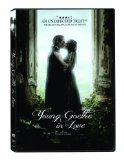| Reviews & Columns |
|
Reviews DVD TV on DVD Blu-ray 4K UHD International DVDs In Theaters Reviews by Studio Video Games Features Collector Series DVDs Easter Egg Database Interviews DVD Talk Radio Feature Articles Columns Anime Talk DVD Savant Horror DVDs The M.O.D. Squad Art House HD Talk Silent DVD
|
DVD Talk Forum |
|
|
| Resources |
|
DVD Price Search Customer Service #'s RCE Info Links |
|
Columns
|
|
|
Young Goethe in Love
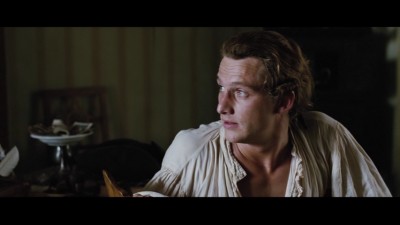
In attempting to sidestep the wary expectation of musty, library-bound decrepitude that is the burden of any literary biopic or period piece (and this film is both), the people responsible for Young Goethe in Love (i.e., director Philipp Stolzl and cowriters Christoph Muller and Alexander Dyoyna) have steered it to the opposite extreme, making the kind of bargain that their subject -- one of the Faust legend's best-known and most important bards -- would recognize all too well. They've pulled out all the stops in order not to scare off the kids, and they have in the process almost entirely betrayed anything valid or worthwhile they could have made of the project (and even backhandedly insulted the pandered-to, supposedly post-literate young audience they're transparently courting by showing what they really think of them) by turning out a film whose abject slavery to contemporary disposable-movie clichés makes even the most prim, stolid, author-venerating stuffiness sound appealing by comparison.
Young Goethe in Love (whose original German title is, amusingly, just Goethe!) proposes to tell the tale of how the 18th-century German godfather of literary Romanticism came to write and publish his early masterpiece, the short 1774 novel The Sorrows of Young Werther, in his early twenties. It's a potentially resonant story of the interrelationship between life and art: the plot of Young Werther is more or less a poeticized version of the very same heartbreak experienced by the young man in his real life -- the sorrow that constitutes the true story told by the film. A struggling wannabe poet and lazy, irresponsible, unwilling law student perpetually hectored and reprimanded by his unremittingly stern father, 23-year-old Johann Goethe (Alexander Fehling) is shipped off to the Superior Court in the distraction-free German backwater of Wetzlar, where his unruliness bumps up against the severity of his new, very staid superior, Albert Kestner (Moritz Bleibtreu, recognizable from Run Lola Run and The Baader-Meinhof Complex). His poetic spirit has trouble fitting in with the bureaucratic hierarchy, of course, but he manages to befriend an affable, stuttering colleague, Wilhelm Jerusalem (Volker Bruch), who invites him to the dance where the writer's raw, unappreciated, discouraged talent will meet its destiny: to be fired in the kiln of a passionate, doomed love for Lotte Buff (Miriam Stein), the daughter of a struggling, widowed petit-bourgeois who, in the interests of her own and her siblings' security, has practically arranged her marriage to the wealthy Kestner.
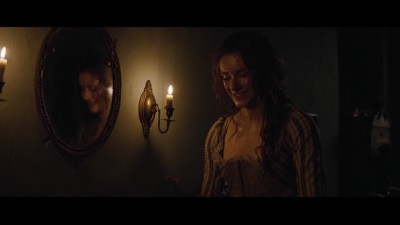
Goethe and Lotte fall head over heels in love with each other, and the young man's relationship with Kestner warms up after its initial frostiness, but once it's revealed that they're both in love with Lotte and it's too late to extricate themselves from the love triangle they've inadvertently stepped into, rivalrous tempers flare, leading to Goethe's disgraceful imprisonment for illegal duelling. There, cut off from his love and in a delirium of anxious, unfulfilled desire, he feverishly scribbles The Sorrows of Young Werther and sends it off to Lotte, who has decided she cannot marry him despite her feelings but continues to devote her unflagging support and benevolent influence to his vocation, taking the liberty of handing off his manuscript to a publisher. By the time Goethe arrives back in Frankfurt, roundly scolded by his father and with his tail between his legs, the bookshops are fighting off crowds of Werther-seekers and cannot keep the book in stock; he has become an overnight sensation and literary celebrity, and, in a cherry-on-top happy ending, his father can finally see the incontrovertible proof that his son's artistic ambitions weren't such a waste of time, after all.
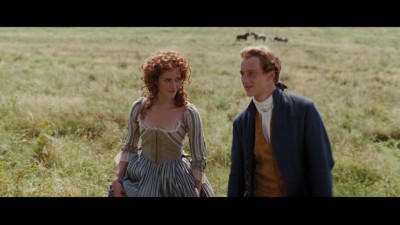
The one halfway intriguing, well-done thing about the film is the extensively green-screened 18th-century exteriors that have been created by its production design and technical teams who seem to have hogged any inspiration that might have been floating around the project; these artisans have wisely avoided the bland, grayish, "realistic" quality that frequently accompanies such maneuvers, instead embracing the aesthetic possibilities arising from the artificiality of what they're up to, a choice that gives the film a strikingly rich visual dimension that recalls Eric Rohmer's The Lady and the Duke (which used a similar technique and approach) and the glorious matte work that enhanced the auras of Hitchcock's Rope and Powell and Pressburger's Black Narcissus. Otherwise, unfortunately, the film is not even dismissably slight, but actively obnoxious. Stolzl and cinematographer Kolja Brandt's competent but shamelessly by-the-numbers setups and movements (ditto for Sven Budelmann's predictable editing); Ingo Frenzel's relentless score, ill-advisedly used as bluntly manipulative punctuation for every little action or feeling occurring onscreen; and the awful way Fehling has been allowed or encouraged to mug his way through every scene all conspire to make most of the film feel like a romantic comedy and/or sitcom we've seen and groaned at dozens of times before. This cookie-cutter approach to story, storytelling, and execution of style through deployment of camera and actors stamps indifference and inconsequentiality onto virtually every frame; there's accessibility, but then there's this -- the kind of pure, bland, servile, mindless conformity that gives accessibility a bad name.
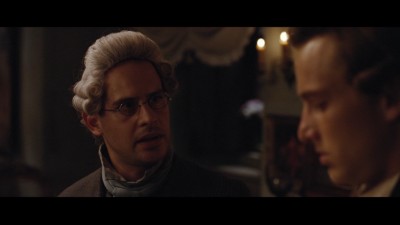
Such a glaring lack of interest is a shame, because Young Goethe in Love's story is one that could conceivably give rise to a movie that actually takes flight; Goethe's emotion-flooded view of the world, the reality from whence that view sprang, or both offer plenty of visual and dramatic possibilities. And there are certainly viable alternatives available to anyone looking for something cinematic to quell their appetite for the capital-R Romanticism of which Goethe (whose Werther, like some 18th-century analogue to a Nirvana album, accrued legions of young fans across Europe and was blamed for a spate of suicides) was one of the founding practitioners. If it's a biographical picture regarding a leading light of Romantic literature you're looking for, Jane Campion's excellent Bright Star, with Ben Whishaw as poet John Keats, will hit the spot and then some. If it's Goethe filtered through a contemporary perspective you're after, by all means indulge yourself with Jose Luis Guerin's short In the City of Lotte and its accompanying extended riff on Goethian Romanticism, In the City of Sylvia. As for Young Goethe in Love, there's simply nothing remotely Romantic about it at all; it's certainly not "stuffy," but it is so constrained by its adherence to nonthreatening averageness that it becomes lifeless. It's the kind of picture whose overeagerness to please makes it not only forgettable but particularly, resoundingly displeasing.
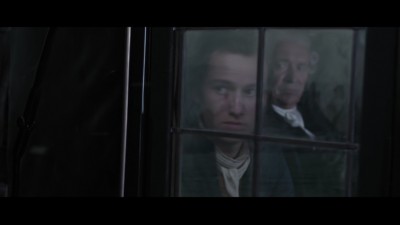
THE DVD:
The transfer presents the film anamorphically at its original aspect ratio of 2.35:1 and ranges, for the most part, from good to excellent, with no pixellating, aliasing, flicker, or other compression artifacting noted, and with all the colors, blacks, and skin tones looking vivid and sharp. The one glaring visual flaw is some unbelievably blatant aliasing around the two principals for the entirety of a key moment in the film (the moment that, if you look somewhere off to the right of this review, is captured -- minus the aliasing, of course -- for the DVD cover).
Sound:The disc has both Dolby Digital 2.0 stereo and Dolby Digital 5.1 surround soundtracks, in German with optional English subtitles. Either one works wonderfully well for the sound capabilities they're made for (though the surround track is the theatrical version and preferable if you have the setup for it), with full clarity, depth, dimensionality, and sonorousness of sound and without even a trace of distortion or imbalance.
Extras:A 27-minute making of does go "behind the scenes" for footage of the shoot and interviews with cast and crew, but it's about as busy and empty as the film itself; the bits and pieces of technical revelation are interesting regardless, but it seems everyone has something dully rehearsed and/or glib to say about the film's conception and story. Much better is the 90-second "visual FX of Young Goethe in Love", which is not so much an explanation as a demonstration of the actually remarkable special-effects construction of the entire period aura of the whole film. The disc also includes the film's U.S. and international theatrical trailers along with several previews for other Music Box releases (including one for Terence Davies's exquisite The Deep Blue Sea, which feels like a taunt the context of the fairly leaden Young Goethe in Love).
FINAL THOUGHTS:Skip It. It was bad enough when we had that run of misleading Jane Austen movies that egregiously mistook Austen's lightness of touch for being simply lightweight; are we now in for a widespread cinematic misunderstanding of Goethe's lush, thundering, passion-drenched Romanticism, in his work and in his life, as mere, forced sitcom whimsy and template-based rom-com convention? If Young Goethe in Love is any indication, the answer is a disappointing yes. In reimagining the great, rebellious, yearning Romantic as a smirking, self-amused renegade character type, and his formative experience as something that was evidently pitched (and, unfortunately, followed through on) as "It's Love Story! But in 18th-century Germany!", director Philipp Stolzl and the rest of those responsible have done their audiences -- either those who already appreciate Goethe or, their more likely cynical target, kids whose ostensibly tiny attention spans they're trying to placate with something cut down into easily digestible familiarity -- a disservice. It's a film whose willful silliness and inconsequentiality, its near-automated regurgitation of stylistic and narrative convention, probably do have to be seen to be believed; I would not, however, advise it.
|
| Popular Reviews |
| Sponsored Links |
|
|
| Sponsored Links |
|
|
| Release List | Reviews | Shop | Newsletter | Forum | DVD Giveaways | Blu-Ray | Advertise |
|
Copyright 2024 DVDTalk.com All Rights Reserved. Legal Info, Privacy Policy, Terms of Use,
Manage Preferences,
Your Privacy Choices | |||||||









